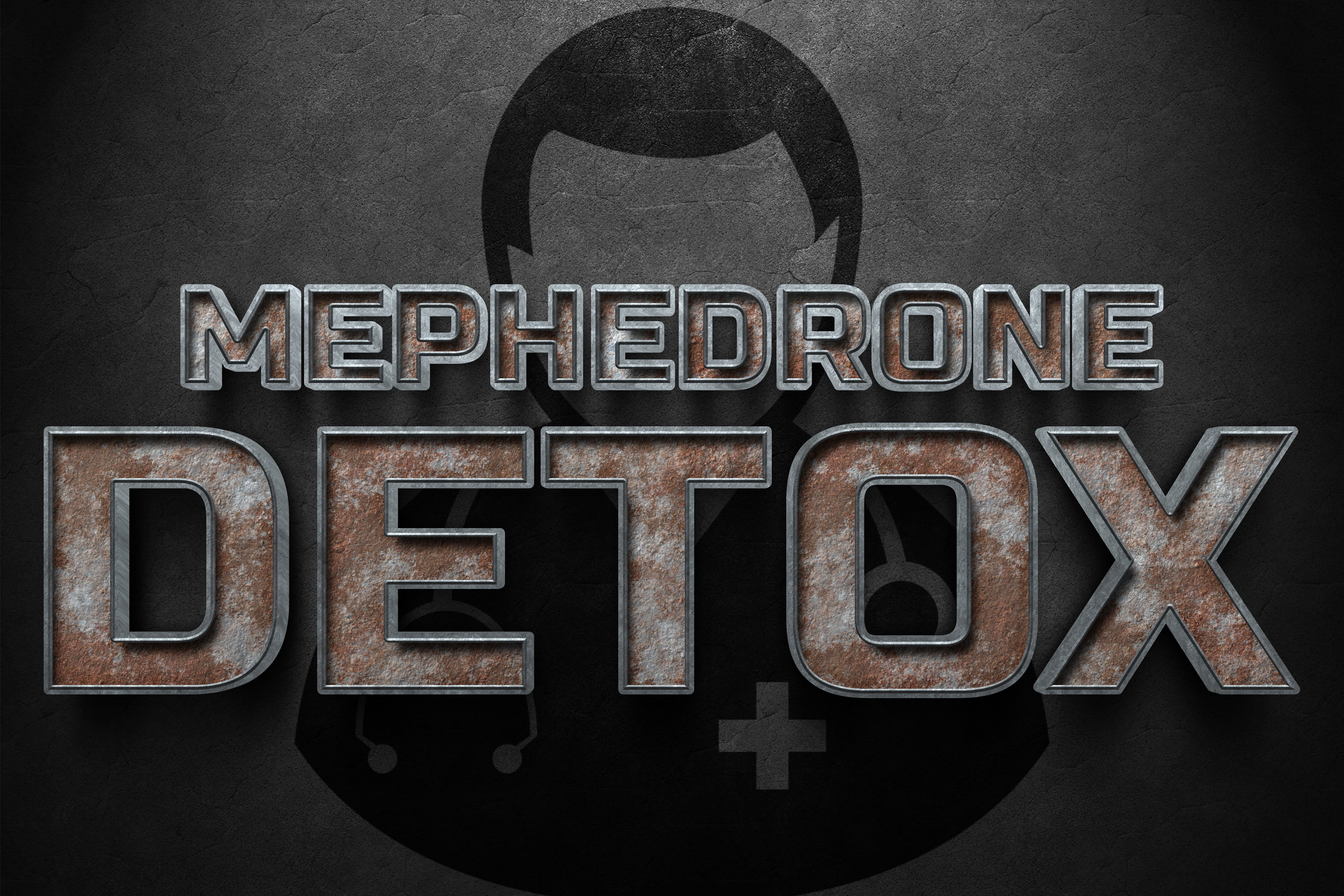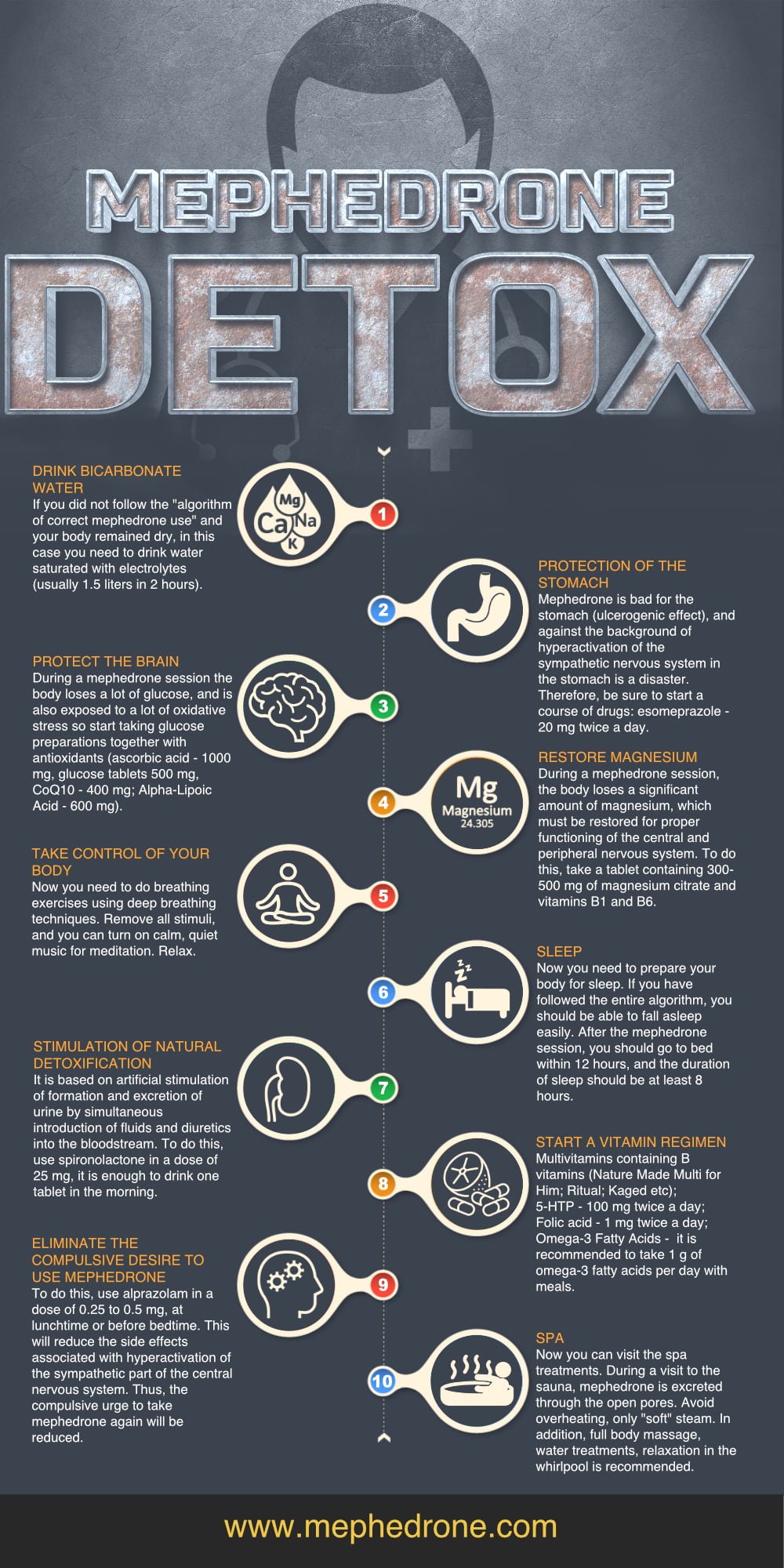In the ever-evolving landscape of psychoactive substances, mephedrone, a synthetic stimulant belonging to the cathinone family, has emerged as a prominent player in recent years. Commonly known as “drone”, “meow meow” or “MCAT“, mephedrone has captured the attention of recreational drug users and researchers alike, owing to its potent psychoactive effects and the potential risks associated with its use.
As the prevalence of mephedrone consumption continues to rise, the need for a comprehensive understanding of detoxification and recovery processes becomes increasingly imperative. This publication delves into the multifaceted world of detoxification after mephedrone use, drawing upon a wealth of information from scientific databases, clinical studies, and expert insights to provide a thorough and enlightening exploration of the subject matter (Mephedrone Detox).
With a firm grasp of the challenges at hand, we proceed to examine the various approaches to detoxification after mephedrone use, ranging from medical interventions to holistic therapies. By consulting an extensive collection of clinical studies, expert opinions, and case reports, we evaluate the efficacy and safety of these detoxification methods, shedding light on the most promising avenues for recovery. In doing so, we also acknowledge the unique needs and circumstances of each individual, emphasizing the importance of personalized care in the detoxification process.
This publication offers a comprehensive, multidisciplinary, and evidence-based exploration of detoxification after mephedrone use, synthesizing a wealth of information from diverse sources to provide a valuable resource for researchers, clinicians, policymakers, and individuals affected by mephedrone use. By illuminating the path to recovery, we hope to contribute to the ongoing efforts to mitigate the harms associated with mephedrone and promote the well-being of individuals and communities worldwide.
Why It Matters
Detoxification is a crucial first step in the arduous journey towards recovery for mephedrone addicts. The significance of this process cannot be overstated, as it serves as the foundation upon which the edifice of rehabilitation is built. By expediting the elimination of mephedrone and its metabolites from the body, detoxification paves the way for the restoration of physiological equilibrium and the reclamation of mental clarity.
Mephedrone detoxification is a complex of procedures that contribute to the purification of the body from the narcotic substance and its metabolites. Detoxification measures are focused on accelerating the process of physiological excretion of mephedrone, restoration of disturbed functions of the nervous system and internal organs, elimination of dehydration, and relief of severe symptoms of withdrawal syndrome.
Toxicity of mephedrone
Mephedrone can be administered through various routes, including oral ingestion, insufflation (snorting), intravenous injection, and rectal administration. The choice of administration route influences the onset, intensity, and duration of the drug’s effects. Intravenous and insufflation routes result in rapid onset and intense effects, while oral ingestion leads to a slower onset and longer-lasting effects.
Mephedrone is primarily metabolized in the liver by phase I enzymes, such as CYP2D6, and phase II enzymes, such as UDP-glucuronosyltransferases (UGTs). The primary metabolites of mephedrone include nor-mephedrone, 4-hydroxytolyl-mephedrone, and their respective glucuronide conjugates. These metabolites are mainly excreted in urine, with a minor proportion eliminated through feces.
Mephedrone’s toxicity manifests through various adverse effects, ranging from mild to severe. Common side effects include tachycardia, hypertension, hyperthermia, sweating, bruxism, and insomnia. More severe complications can arise, such as seizures, hyponatremia, rhabdomyolysis, acute kidney injury, and serotonin syndrome.
Cardiovascular toxicity is a significant concern with mephedrone use, as it can lead to myocardial infarction, arrhythmias, and sudden cardiac death. Additionally, mephedrone has been associated with neurotoxicity, resulting in cognitive impairment, memory deficits, and increased risk of developing neurodegenerative disorders.
After a mephedrone session, the most common symptoms of intoxication include:
-
Depression/very bad feeling
-
Shaking and tremors
-
Sense of fatigue
-
Nausea
-
Restlessness
-
Feeling of agitation
-
Headaches
-
Dizziness
-
Sleep disturbance
-
Digestive problems
Detoxification
In general, the detoxification algorithm consists of following a special “regime of the day” and taking certain medications, depending on how much time has passed since the end of the mephedrone session.
Most “withdrawal symptoms” usually occur within the first three days and gradually subside over the next two weeks. This can vary from person to person – mephedrone withdrawal can last many months in some severe addiction cases.
Day 1
After a mephedrone session, the body primarily needs sleep, mental and physical tranquility. This period is the hardest because your body craves the next dose of mephedrone, and you didn’t take it as expected.
Your mood may drop to the point where you have suicidal thoughts. This is because your levels of “good mood hormones” have dropped to an all-time low and must rise again and stabilize again. The hormones most affected are serotonin, norepinephrine and dopamine. You will feel a strong craving for mephedrone, fatigue, apathy and depression.
The algorithm for the first day includes:
-
Take sedatives – alprazolam 1 mg.
-
Drink bicarbonate water – if you did not follow the “algorithm of correct mephedrone use” and your body remained dry, in this case you need to drink water saturated with electrolytes (usually 1.5 liters in 2 hours).
-
Gastrointestinal cleansing – if you took mephedrone “bombs” start taking enterosorbents.
-
Protection of the stomach – mephedrone is bad for the stomach (ulcerogenic effect), and against the background of hyperactivation of the sympathetic nervous system in the stomach is a disaster. Therefore, be sure to start a course of drugs: esomeprazole – 20 mg twice a day.
-
Protect the brain – during a mephedrone session the body loses a lot of glucose, and is also exposed to a lot of oxidative stress so start taking glucose preparations together with antioxidants (ascorbic acid – 1000 mg, glucose tablets 500 mg, CoQ10 – 400 mg; Alpha-Lipoic Acid – 600 mg).
-
Calm your body – take a warm shower, then make the water cold. In this way, it will “reset” the work of the peripheral nervous system.
-
Restore magnesium – during a mephedrone session, the body loses a significant amount of magnesium, which must be restored for proper functioning of the central and peripheral nervous system. To do this, take a tablet containing 300-500 mg of magnesium citrate and vitamins B1 and B6.
-
Take control of your body – now you need to do breathing exercises using deep breathing techniques. Remove all stimuli, and you can turn on calm, quiet music for meditation. Relax.
-
Sleep – now you need to prepare your body for sleep. If you have followed the entire algorithm, you should be able to fall asleep easily. After the mephedrone session, you should go to bed within 12 hours, and the duration of sleep should be at least 8 hours. The complex of drugs will allow you to increase the time of the “useful” phase of sleep.
Day 2
The second day of detox should be as calm as possible, make yoga your friend, meditate, do general strengthening exercises, you can find solitude with nature.
Medications for the second day:
-
Fluid and electrolyte balance – use bicarbonate water during the day, you should drink about 250 ml every two hours, but no more than 2 liters in 12 hours.
-
Stimulation of natural detoxification – mephedrone is eliminated from the body through the kidneys and sweat. In order to speed up this process, the method of forced diuresis is used. It is based on artificial stimulation of formation and excretion of urine by simultaneous introduction of fluids and diuretics into the bloodstream. To do this, use spironolactone in a dose of 25 mg, it is enough to drink one tablet in the morning.
-
Start a vitamin regimen – multivitamins containing B vitamins (Nature Made Multi for Him; Ritual; Kaged etc).
-
Eliminate the compulsive desire to use mephedrone – to do this, use alprazolam at a dose of 0.25 to 0.5 mg, at lunch or before bedtime. This will reduce the side effects associated with hyperactivation of the sympathetic part of the central nervous system. Thus, the compulsive urge to take mephedrone again will be reduced.
-
Magnesium supplements – long-term use of stimulants leads to depletion of magnesium reserves in the body. Heart attack at the age of 30-40 is most often due to magnesium deficiency. Supplements of choice are magnesium orotate or magnesium citrate. Daily dose of magnesium 330 – 450 mg.
-
5-HTP – 100 mg twice a day (must be taken for one month with meals).
-
Folic acid – 1 mg twice a day (must be taken for one month with meals).
-
Omega-3 Fatty Acids – essential fatty acids help delay the occurrence of early atherosclerosis, and also have a positive effect on the course of any type of depression. It is recommended to take 1 g of omega-3 fatty acids per day with meals.
-
Extra brain protection – from the second day of detoxification you need to start taking L-carnitine (levocarnitine) at a dose of 1000 mg per day, this will further protect your brain from the neurotoxic effects of mephedrone metabolites.
-
Sleep – don’t forget about adequate sleep, if you followed the whole detoxification algorithm correctly, you are guaranteed a good night’s sleep.
Day 3
On the third day of detoxification, the effects of mephedrone withdrawal will gradually begin to subside, and the compulsive urge to use mephedrone again will go away. It is no longer necessary to take sedatives and diuretics.
Starting from the third day you need to fill your body with bicarbonate water, continue taking the biologically active supplements that you started drinking on the second day of detoxification.
In addition, you need to add the following medications:
-
Alphalipoic acid – 250 mg an hour before the drug use and 250 mg after. Enhances the effect of levocarnitine and increases antioxidant activity, and it all help to remove free radicals from the body.
-
Vitamin C – must be taken for a long time. During the first two weeks the dose of vitamin C should be 1000 mg per day, then the dose should be reduced and take 500 mg per day for the next four weeks.
-
L-tryptophan and L-tyrosine – are aminoacids and precursors of serotonin and dopamine. Take once a day L-tyrosine 1000 mg in the morning, L-tryptophan 500-1000 mg in the evening 30 minutes before the expected sleep.
-
Dietary foods – from the third day of detoxification, start a diet. You are shown sour milk products, greens, fruits and vegetables rich in fiber. All difficult to digest dishes, smoked meats, canned foods, dairy products, desserts and pastries, fatty and spicy foods are excluded from the diet.
-
Spa – now you can visit the spa treatments. During a visit to the sauna, mephedrone is excreted through the open pores. The method is not suitable for hypertensive people and people with heart disease, but if you do not have such problems, then use this method. Avoid overheating, only “soft” steam. In addition, full body massage, water treatments, relaxation in the whirlpool is recommended.
Conclusion
Pharmacological interventions play a crucial role in the initial stages of detoxification, as they serve to alleviate the acute withdrawal symptoms that often accompany cessation of mephedrone use. Benzodiazepines, for instance, have been employed to assuage the anxiety, agitation, and insomnia that frequently beset those in the throes of withdrawal.
Moreover, the incorporation of mindfulness-based practices, such as meditation and yoga, can foster a sense of self-awareness and self-compassion, enabling individuals to navigate the turbulent waters of recovery with greater equanimity.
Lifestyle modifications, though often overlooked, are the bedrock upon which lasting recovery is built. A well-balanced diet replete with nutrient-dense foods can help to repair the damage wrought by mephedrone on the body’s vital systems, while regular exercise can bolster cardiovascular health and promote the release of endorphins, the body’s natural mood elevators.
Thus, a comprehensive medication and strengthening therapy during the first days after mephedrone session can restore the normal functioning of organs and systems, remove harmful metabolites of mephedrone from the body, reduce and eliminate the side effects associated with mephedrone use, and return a person to normal life.




